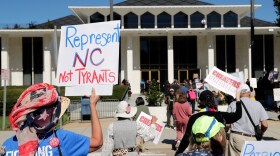Bob Phillips mused that if the U.S. Supreme Court had ruled definitively in his organization's favor, we would not be "seeing this kind of arms race at the moment."
Phillips is executive director of Common Cause North Carolina. The government watchdog group was one of the plaintiffs in a consolidated case challenging the constitutionality of a Congressional district map drawn by the North Carolina General Assembly's Republican majority.
Now, the GOP powerplay in Texas has sparked a redistricting arms race, with blue-state behemoths like California Democrats planning to redraw their state's voting boundaries to win more Congressional seats. This partisan tit-for-tat can be traced back to that North Carolina gerrymandering case, known as Rucho v. Common Cause.
"We basically were saying that the legislature was punishing voters because of their party affiliation, i.e., viewpoint discrimination," Phillips said, explaining the central complaint in Rucho.
Rucho arrived at the U.S. Supreme Court in 2019 after a lower federal court sided with the map's challengers and found the congressional districts to be unconstitutionally gerrymandered.
At that point, Common Cause and the other plaintiffs had succeeded in arguing that GOP lawmakers relied on precise partisan data about voters' behavior to maximize their grip on political power.
"Everything's in a primary that tends to reward the extremes from both parties," Phillips argued, describing what he sees as the consequence of extreme partisan gerrymandering. "You don't have campaigns; issues are not discussed."
In his prevailing 5-4 majority opinion in Rucho, Chief Justice John Roberts said even if partisan gerrymandering is inconsistent with democratic principles, it doesn't mean the federal judiciary can do anything about it. Roberts said it's a nonjusticiable political question best left to the states, their laws, and their courts to resolve.
So, when the conservative Fifth Circuit Court of Appeals ruled last year that some Texas Congressional districts needed to be redrawn because they didn't warrant minority protections under the Voting Rights Act, Pres. Donald Trump wasted no time.
Trump urged Texas Gov. Greg Abbott to get GOP state legislators to draw extreme partisan maps that would deliver Republicans five more Congressional seats in next year's midterm elections. Under Rucho, they could.
Former North Carolina Supreme Court Justice Bob Orr said even though he rues the outcome and legacy of Rucho he thinks the Roberts court got it right.
"You know, there's nothing in the Constitution that requires proportionality and to thrust the court into trying to evaluate maps as to whether there should be seven Democrats, seven Republicans, guaranteed seats, or 14 tossup seats, that's not someplace the court should be," Orr said.
But Orr doesn't think extreme partisan gerrymandering should go unchecked. He said the key to fighting the practice in court is not to focus on the issue of proportionality but to argue it violates fundamental constitutional rights to free and fair elections.
"There has to be a manageable standard for courts to apply, and I think a standard that says government, in this case the legislature, in drawing districts cannot use political data in the creation of these districts," Orr said.
In other words, map makers should stick to traditional, nonpartisan criteria such as compactness, contiguity, and preserving communities of interest.
But the framers of the Constitution were well aware of partisan consideration in the drawing of voting districts and said nothing about courts restricting it, according to conservative legal scholar John Malcom, vice president of the Institute for Constitutional Government at The Heritage Foundation in Washington D.C.
"Now, can that result in inequities in terms of percentages of votes?" Malcolm asked. "Yes, it certainly can."
For proof of such inequities, Malcolm said to look no further than some of the blue states threatening to redraw maps in retaliation to Texas' redistricting effort.
"California, for example, has got 52 Congressional seats, only nine of them are held by Republicans even though Donald Trump won about 40 percent of the vote," he said.
The inequities notwithstanding, Malcolm said the way to address these issues is for voters to cast ballots in support of their preferred candidates and issues, or to move to states that better reflect their political bent.
"Democracy can be messy," Malcolm said, "but it's also been pretty stable and worked pretty well for us."







